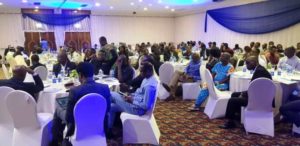The Nigerian government said it will provide requisite spectrum for the deployment of drone technology. Specifically, it has set machinery in place to review guidelines on the use of 2.4GHz and 5.8GHz bands respectively to accommodate the emerging technology.
The Executive Vice Chairman of the Nigerian Communications Commission, Prof. Umar Danbatta disclosed this yesterday in Lagos in a speech he delivered at the stakeholder consultative forum on ‘Regulation Of Drone: The Spectrum Perspective’.
The essence of allocating spectrum to drone deployment, according to Danbatta is to tackle the myriad of challenges such as vandalism of critical national infrastructure, kidnapping, insurgencies, terrorism that Nigeria presently contends.
“The Commission wishes to inform our stakeholders of the appropriate Spectrum for drones and its conditions of use in order to help in realizing the set objectives of deploying them to tackle the security challenges and for commercial services too,” Danbatta, who was represented by Adeleke Adewolu, Executive Commissioner Stakeholder Management at NCC said.
Danbatta also notes that the guidelines for the use of 2.4GHz and 5.8GHz Spectrum bands are presently limited in its condition of use and therefore require amendments. Toward this end, the new draft guidelines have incorporated some changes which include but not limited to Duty cycle, Transmission, Reception Frequencies, Power, Distance, Speed and Weight.

This, he believe will give an added opportunity to the use of drones in the bands without causing interference to the adjacent and incumbent services.
Meanwhile, Engr. Austin Nwaulune, Director, Spectrum Administration at the Nigerian Communications Commission has brought to the attention of Nigeria that Unmanned Aircraft Vehicle (UAV) technology otherwise known as the drone has gone through massive development in recent years, and the market for drones shows exponential growth, similar to all other significant new technologies.
He said drones have found application in several areas that are contributing to the development of nations in the areas of security surveillance, shipping and delivery, disaster management, rescue operations, and healthcare, archaeological surveys, geographic mapping, law enforcement, safety inspection. Agriculture and wildlife monitoring.
“The security of any Nation typically involves conducting consistent surveys of potential flashpoints in order to ensure the protection of the populace and the entire environment. Using drones, in this case, could be an interesting idea. This reduces manual labor and affords a wider field of view. This also does not hamper the normal lives of the people, as they do not have to enter these dangerous areas themselves. Drones have a lot of potential in terms of law enforcement – these devices have the innate ability to hover around locations without drawing much attention from the people. Thus, this can be used for surveillance or for public safety,” he told the gathering, which includes security agencies.
 The drone market, according to Engr. Nwaulune is scaling rapidly and delivering enriched services in the process. Thus, the wealth of new applications of this new technology and the role that stakeholders can play is very critical.
The drone market, according to Engr. Nwaulune is scaling rapidly and delivering enriched services in the process. Thus, the wealth of new applications of this new technology and the role that stakeholders can play is very critical.
He explained that the stakeholder forum has been organized to bring together all stakeholders featuring drone experts, operators, law enforcement agencies and business representatives to discuss and share their views on development trends and innovative applications of drone industry as well as the technicalities associated with deployments of drones relates to spectrum from the standpoint of Spectrum use.




